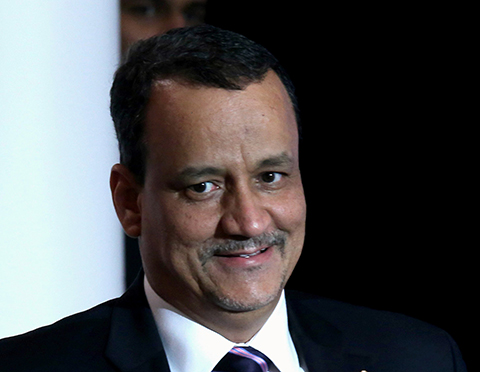 United Nations Special Envoy to Yemen, Ismail Ould Cheikh Ahmed speaks during a press conference on May 15, 2016 at the information ministry in Kuwait City. The UN special envoy to Yemen held talks with the country's warring parties in a bid to break an impasse. -AFP
United Nations Special Envoy to Yemen, Ismail Ould Cheikh Ahmed speaks during a press conference on May 15, 2016 at the information ministry in Kuwait City. The UN special envoy to Yemen held talks with the country's warring parties in a bid to break an impasse. -AFPKUWAIT: The UN special envoy to Yemen said yesterday he is optimistic about achieving a peaceful settlement in the war-torn country, but admitted "difficult matters" remain unresolved. Ismail Ould Cheikh Ahmed said some progress had been achieved in the talks which began on April 21. "Now, we have an opportunity to reach a peaceful settlement... the progress we have made on some points makes us optimistic," he told a news conference. "But there remains some difficult matters... the problem is reaching a clear political agreement."
But the envoy declined to provide details on the progress made other than an agreement in principle to free 50 percent of prisoners and detainees before the start of the fasting month of Ramadan in the first week of June. There has been mounting international pressure to end the Yemen conflict, which the United Nations estimates has killed more than 6,400 people and displaced 2.8 million since March last year. The talks pit the Iran-backed Houthi militia and their allies of forces loyal to former president Ali Abdullah Saleh against the government of President Abedrabbo Mansour Hadi.
UN Security Council Resolution 2216, issued more than a year ago, orders the Houthi rebels to pull out of territory they occupied in a 2014 offensive and surrender heavy arms they captured. Pro-government forces pushed the rebels out of five southern provinces last year. The Houthis however still control the capital Sanaa as well as large parts of the country's north and west. The stumbling block at the talks remains the form of the government that would control Yemen in a transitional period. The rebels are demanding to share power with Hadi while his delegation insists he is the legitimate head of state under UN resolutions. Ould Cheikh Ahmed said UN agencies provide aid to more than 13 million Yemenis. - AFP










